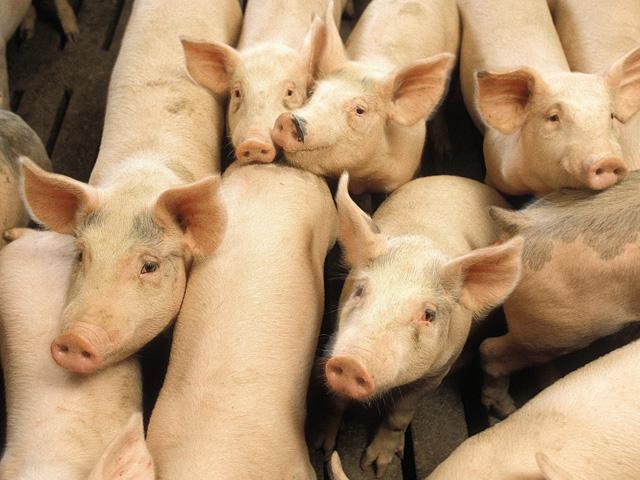DOJ Sides With Agriculture on Prop 12
Department of Justice Raises Biosecurity, Emergency Food Assistance Program Concerns About Prop 12
OMAHA (DTN) -- The U.S. Department of Justice and the North American Meat Institute asked a federal appeals court for a full hearing on a requested injunction to halt implementation of California's Proposition 12, alleging the law would disrupt programs at USDA.
The U.S. Court of Appeals for the Ninth Circuit in San Francisco recently rejected NAMI's request for an injunction against the law that requires hog producers to abide by certain regulations in order to sell pork in California. Voters in the state passed Proposition 12 in 2018.
Ag groups and 20 states are challenging the law, arguing it violates the Commerce Clause.
In an amicus brief filed with the Ninth Circuit on behalf of NAMI, DOJ makes a case for an en banc hearing and raises a number of concerns about the law as it relates to government programs. If granted, an en banc hearing would occur before all of the judges in the Ninth Circuit.
As of Jan. 1, 2022, Proposition 12 prohibits the sale of pork not produced according to California's production standards. Proposition 12 applies to any uncooked pork sold in the state, regardless of whether it was raised in California.
The DOJ said in its brief the law is likely to have "several adverse effects" on functions and programs at USDA.
"For example, Proposition 12 would frustrate USDA policy not to buy products that are specialized or geographic in nature for the Emergency Food Assistance Program," the brief said.
P[L1] D[0x0] M[300x250] OOP[F] ADUNIT[] T[]
"Any price increases in food products attributable to the new law would make such assistance programs more expensive and reduce the buying power of benefits under the Supplemental Nutrition Assistance Program."
The DOJ also raises biosecurity concerns coming into play with Proposition 12.
"Inspections by state officials, as contemplated by draft regulations implementing Proposition 12, could increase the risk of transmission of disease among farms. Such increased risk in turn threatens additional burdens on USDA's Animal Plant and Health Inspection Service, whose veterinary services program supports farmers by responding to animal disease emergencies."
In addition, DOJ said USDA's Agricultural Marketing Service would have to adjust price formulas used to "price most hogs sold today, a resource-intensive task given the number of market participants who must respond to the law's requirements, the short time frame available to achieve compliance, and uncertainty as to how producers will respond to any categorization decisions."
Ag groups including the National Pork Producers Council and the American Farm Bureau Federation were joined in the lawsuit in October by the states of Indiana, Alabama, Alaska, Arkansas, Georgia, Iowa, Kansas, Louisiana, Missouri, Montana, Nebraska, North Dakota, Ohio, Oklahoma, South Carolina, South Dakota, Texas, Utah, West Virginia and Wyoming.
The ag groups had their case dismissed in the U.S. District Court for the Southern District of California in April. The groups asked the court to decide whether the state can enforce Proposition 12 against farmers in other states.
The states have argued Proposition 12 is unconstitutional and violates the Commerce Clause.
The states point to two Supreme Court rulings holding that courts are required to consider the practical effects of a state law when dealing with the Commerce Clause.
In this case, the ag groups have argued the practical effect of Proposition 12 is to regulate ag producers in other states.
Several industry groups also have joined the ag groups in their appeal, including the National Association of Manufacturers, the Chamber of Commerce of the United States of America, FMI -- The Food Industry Association, the National Cattlemen's Beef Association and the National Mining Association.
The law forbids the sale of whole pork meat in California from hogs born of sows not housed in conformity with the law. Proposition 12 forbids sows from being confined in such a way that they cannot lie down, stand up, fully extend their limbs, or turn around without touching the sides of their stalls or other animals.
According to the National Pork Producers Council, less than 1% of pork produced in the United States meets Proposition 12 requirements.
The state needs about 700,000 sows to satisfy its pork demand. About 1,500 out of California's 8,000 sows are used in commercial breeding housed in small farms. The NPPC has argued because the state has to import most of its sows, Proposition 12 essentially regulates farmers beyond state borders.
Todd Neeley can be reached at todd.neeley@dtn.com
Follow him on Twitter @toddneeleyDTN
(c) Copyright 2020 DTN, LLC. All rights reserved.




